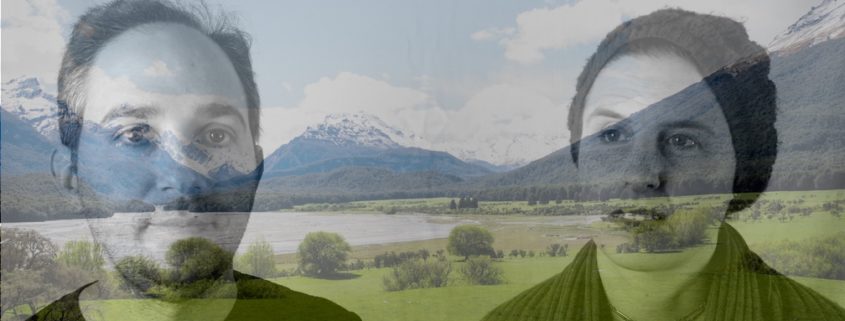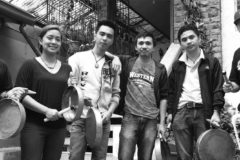INTERVIEW: Aaron Siegel And Mallory Catlett
Collaborators Aaron Siegel (composer) and Mallory Catlett (director) have been exploring of the work of Janet Frame, and particularly the novel ‘Yellow Flowers in the Antipodean Room’ as they make a new opera together. They have worked together and with performers to shape Frame’s writing into performance and have encountered a range of questions and opportunities along the way. They sat down in advance of a workshop performance of scenes from the opera on November 30th at Roulette to discuss aspects of their working process and some of the ideas that are embedded in the source materials for their new opera ‘Rainbird.’
AARON SIEGEL: Since you have worked with Frame’s writing before, how do you think your proximity to the texts makes it hard for you to synthesize them?
MALLORY CATLETT: I think it’s just the way that I worked with the material the last time. I was making a piece, and there were 21 different sources in it. So my focus was on the kinds of themes that ran through a lot of her work. I remember when I told you about the book (Yellow Flowers in the Antipodean Room), I was like, “But there’s this one novel that I’ve always been interested in turning into an opera.” There are a few other of her books that are amazing stories, but this one always struck me as something I would want to work on as a stand alone work.
My process for that last piece was to retype all these excerpts from over 21 books. And so I had these giant binders that were labeled by topic like ‘weather’ and ‘pronouns,’ and I just came up with ways to categorize all this text that I had pulled, that I thought was somehow involved. My roommate used to kid me. He said, “So you’re retyping the novel?”
So that’s how I know the language really well, is because it was a very manual—it was extremely labor-intensive. It was kind of like learning how to make something the first time. Because I was in graduate school, and I had resources, I could be very deliberate about the way in which I arrived at the piece. I think that really informed how I make everything now. But, I feel like it’s hard for me to go to a single novel and not think about all the novels.
SIEGEL: That’s one of the interesting things that I’ve found about approaching this work with you is that as a music maker, I just would never think about going to someone’s full oeuvre to examine and make work. My interest is more about focusing on one specific thing, and making that really clear. That’s the way in which I’m a minimalist. I prefer those very minute details for one thing, and not to be concerned with the full body of work of a single person, and all the ways in which it creates a philosophy. I remember taking philosophy classes, and just really hating the notion that there was no way that my brain could actually process the sort of gestalt theories or ideas that a lot of these philosophers were thinking about. And I’ve come to realize in some ways that’s because I’m less interested in those gestalt theories, and more interested in examples of a how a philosophy is visible in everyday life
As I’ve been writing, I’ve been thinking more about the way that we’re working together, and thinking about how my role is about finding ways to concretize things and make them real and physical.
CATLETT: I think that’s why I like to work with you, because it feels like we think about things very differently. And I think that kind of thing is hard for me to do, but when I’m collaborating, it’s very refreshing because I always start from the big problem that seems extremely complicated.
It’s a process of reading everything to whittle down to what I’m really on about. It’s a little bit like when I start getting into something, and I have no idea why. I know that I’m interested or whatever. But making the work is really figuring out how it really speaks to me. And I get into things before I have any idea.
When I was working in graduate school, I was also studying with a literary professor there who happened to teach Frame. He was a post-colonial scholar. I was working with this French philosopher named Hélène Cixous, and we were doing this reading of her philosophy of Frame’s work, which he had never done. So it was pretty extensive.
And I think it had a lot to do with what I was really drawn to. And so applying that sort of philosophic framework on the writing was the way in which I understood why the writing was important, and what I was going to do.
I was listening to the radio one day, and it was some piece of music that was telling the Orpheus and Eurydice story. I think it was the Monteverdi, but I don’t know. I just had this image, and knew I was going to do a piece about Orpheus and Eurydice. And then the more I learned about Orpheus, I wondered I how could wade into that story without reproducing those gendered dynamics of the myth.
And at the same time, I was just reading Frame, and her work is extremely Eurydic and Orphic. It has lush poetry that takes you over. But it also has this kind of cyclical death pattern that’s constantly running through it. And it’s all over the novel.
SIEGEL: How do you see the Orpheus myth of playing out in ‘Yellow Flowers in the Antipodean Room?” Because Godfrey is sort of an Orphic character, and yet there’s not a sense of him being the poet.
CATLETT: I think this book is very Orphic because, in the last part of the myth after Eurydice dies a second time, Orpheus is actually ripped apart by these Bacchanalia women, and he becomes an oracle. He gets more dangerous because he has had this experience. He becomes more of a threat and so he is destroyed. ‘Yellow Flowers’ is much more about this part of the myth, about how the culture turns away and has to destroy the thing it is afraid of.
I’ve never really been that interested in myth. I’ve never been that interested in Greek theatre, but I think a lot of my earlier work with Frame was really understanding what myth is in a different way.
Coming back to Hélène Cixous, she describes myth as trying to find the point of origin of all of these moments. In Orpheus you have this quintessential relationship of a man and a woman, where she’s always behind. He has to look back. So the question is: how does one subvert myths or change them at the root?
Cixous has a great way of reinterpreting Adam and Eve, which is that the knowledge is actually in the taste of the fruit, and that women have always been the ones that sought out the knowledge despite the risk. But it’s actually in the sensual kind of taste, and in the smell. And Adam is much more about prohibition and law. Like the policing of that stuff. When you go all the way back, then you can begin to unravel it on your own terms, which is what I think Frame is very much doing. I guess I’m much more of a seeker like this somehow. It feels a little bottomless sometimes, for me.
SIEGEL: I really appreciate the fact that in this collaboration, we can help and challenge each other in those ways, to see things differently and also to attend to the ways each other are seeing them. And the challenge of composing is always “what are people actually going to do?” You have to prescribe that in some ways if it’s going to have its own identity. I try to find that balance between setting things down in structurally immovable ways and letting the performers have some ownership of their material. I think that’s why composers get a bad rap, because of the sense that they’re inflexibile. But trying to figure out how to attend to the form and also give space for the collaboration to feed into the process is really interesting.
CATLETT: Directors have that same sort of rap too. I think we’re both actually sensitive to that. I think we’re both aware of our power, and I think we share a skepticism about its necessity and danger. There was a point in my creative life where I realized that if I want performers to be invested, I have to do things that will undermine my authority.
SIEGEL: From the composer’s standpoint, power is relinquished when the written music can’t be heard until it is performed by live musicians. I do a lot of playback and mocking things up on my computer, and I can do a lot of fiddling in that way. But then there’s a certain point where my mock-ups can’t capture the true subtleties of the instrument. And that’s good. It lets the music breathe, and lets other people take ownership. It lets performers come into the process and feel empowered rather than feel like they’re articulating my vision or my very precise directions.
CATLETT: A lot of people who don’t have any experience of the process have this thing in their mind, which is that, “Oh yeah, the director has the answers.” And then the performers just execute those answers. We have to dispel that. Once performers start rehearsing I can give performers a suggestion, and they’re like, “Oh, OK, that’s done. We’ll do it that way.” But then I look at it with them and think, “No, we could do that 3,000 different ways.” That the tighter it gets, the more options there are moving forward.
That’s why it is fun to work on this with you, with these singers, from the beginning. Because I feel like they’re bringing that element into it from the inception. And that’s really useful for me, because I’m part of the composing process in a very passive way where I can just take in a lot of information. Where I don’t have to produce.
And maybe that’s why working in opera and with music is good too, because there’s always something to do. There’s always another thing that the performers can focus on. And then I can just make adjustments to see how things change without it being a singular focus on that.



